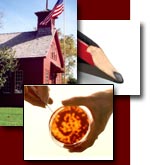| Site Map | Contacts | Links | Newsletter | |
Homeschool:
English
I. Introduction to language
There are three major groups of languages from which all other languages have originated, except Sumerian. They are named after the three sons of Noah, Japheth, Shem, and Ham (Genesis 10:1).
- Japhetic-Indo-European.
- Germanic. English is West Germanic
- Celtic.
- Italic-Latin from which the 5 Romance languages have originated.
- Italian
- Spanish
- French
- Portuguese
- Romanian
- Hellenic-Greek.
- Doric
- Aeolic
- Mycenaean
- Attic-Ionic (Greek- Classical and Koine - New Testament).
- Anatolian-Hittite.
- Armenian.
- Balto-Slavic.
- Indo-Iranian.
- Iranic-Persian
- Indic-Sanskrit
- Hamitic
- Semitic
- North Semitic.
- Aramaic.
- Amorite.
- North-West Semitic.
- Hebrew.
- Canaanite-Ugaritic.
- Moabite.
- Phoenician.
- East Semitic.
- Akkadian.
- South Semitic.
- Arabic.
- Ethiopic.
- North Semitic.
II. History of the English Language.
-
Old English 499-1100 AD.
Matthew 6:9 "faeder ure bu be eart on heofonum, Si bin nama gehalgod." -
Middle English 1100-1500 AD.
Matthew 6:9 "Oure fadir that art in heuenes , halewind be thi name." -
Early Modern English 1500-1800 AD.
Matthew 6:9 "Our father which art in heauen, hallowed be thy name." -
Modern English 1800-Today.
III. English language. The 8 parts of speech.
- Noun - a person, place, thing, or idea.
- Subjective-Nominative case subject of sentence, doing the action.
- Objective case- noun receiving the action of the verb.
- Possessive case - showing ownership.
- Singular add 's or ' if ending in s.
- Plural add s'.
- Pronoun - takes the place of a noun.
- Subjective case pronouns
Singular Plural First Person I we Second Person you you Third Person he, she, it they
- Objective case pronouns
Singular Plural First Person me us Second Person you you Third Person him, her, it them
- Possessive Case pronouns
Singular Plural First Person my, mine our, ours Second Person your, yours your, yours Third Person his, her, hers, its their, theirs
- Demonstrative Pronouns
Singular Plural Near this these Far that those
- Subjective case pronouns
- Adjective - describes a noun.
- Verb - shows action, or state of being.
- Adverb - adds to the verb, never to a noun. Many end in -ly.
- Conjunction - connect words and phrases like and, but, or, nor.
- Preposition - shows position or relationship of an object.
- Interjection - Oh!
Vocabulary
Many of our English words come from ancient languages. Below is a helpful chart. Can you think of other examples?
| Number | Greek | Example | Latin | Example |
|---|---|---|---|---|
| one | mono,mon | monograph | uni | unicycle |
| two | di,du | dual | du,bi | bicycle |
| three | tri | tricycle | tri | trinity |
| four | tetro | tetrahedron | quad | quarter |
| five | penta | pentagon | quin | quintuplets |
| six | hex | hexagon | sex | sextet |
| seven | hept | heptagon | sept | September |
| eight | oct | octopus | oct | octagon |
| nine | enne | ennead | nov | November |
| ten | dec | decimal | DEC | decade |
